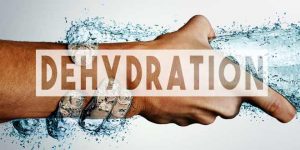What are some health problems you might not realize were caused
by dehydration? How does dehydration cause each?

By: Dr. Keith Kantor
Dehydration is commonly identified with symptoms of low energy, dizziness, mental confusion, and this happens to those who are sweating for a long period of time, typically in hot weather without replacing fluids.
Dehydration can be dangerous because of electrolyte imbalances, if this gets to a major imbalance the body will go into shock and organs can shut down, resulting in permanent damage that may not be able to be repaired.
The less serious complications include weight gain, people often mistake dehydration for hunger and instead of drinking water they consuming salty snacks that pack on the pounds. I often tell clients to drink 1-2 cups of water instead of giving into cravings and wait 15 minutes, the craving will reduce or go away in most cases.
The type of water also makes a difference. Hydroxide alkaline water is the best water and it will hydrate best due to its molecular make up. Hydroxide alkaline water helps eliminate inflammation which is caused by excess H+ ions. The OH- ions in the hydroxide alkaline water combines with the H+ ion forming water and the body can use the water in metabolism or eliminate it. It is also the only water that eliminated acidity instead of just buffering it like other alkaline waters. It is also the only water that produces more water, called “ultra-hydration which can be very useful when dehydrated and to help detoxify the body. (see www.optharmony.com for more information, test results etc.) In addition to hydroxide alkaline water I recommend pure coconut water mixed with hydroxide alkaline water and a touch of sea salt. This is a complete electrolyte drink (homemade sports drink) that does not contain any dye and almost no sugar as the traditional sports drinksdo.
Everyone should aim to consume at least half of their body weight in ounces of water per day. Endurance athletes or those who perform heavy manual labor in the heat, resulting in excessive sweat should consume an additional 2 cups of water per one hour of training or labor.

